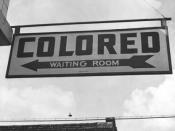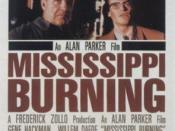In 'To Kill a Mockingbird' Atticus, with reluctance, accepts the necessity of justice in an unjust society. While he fights for justice in the Tom Robinson case, he educates his children against racism, to try to remove the social prejudice in the community of Maycome. In 'Mississippi Burning', the injustice of Southern American society is brutal and only a few souls are strong enough to fight back. Ward attempts to politically solve of the problem of racial prejudice, Anderson, riddled with frustration, attacks the seeds of racism and succeeds in delivering justice and equality to the unequal state of Mississippi.
Atticus reluctantly accepts his duty to remove the injustice of society in Maycome County. Though as the case progresses, he realises that there is no hope of him winning. Instead of giving up, he continues, to make an example for the whole community, especially his children, that racial prejudice must be abolished.
Even when Attticus's life is in danger, he maintains his strong stance against racism 'Mr Bob Ewell...spat in his face..."I wish Bob Ewell wouldn't chew tobacco" was all Atticus had to say about it. He tells his children '"I couldn't go to church and worship God if I didn't try to help that man."' He succeeds in educating his children against the social injustice of Maycome County, as he realises that racism is too deeply embedded in society to be removed in the current generation.
In 'Mississippi Burning', Ward attempts to "Follow regulations" in confronting racism in Mississippi. He attempts to treat the Negro community as equals, by asking questions in a civilized way. However, he is unable to penetrate the cloak of prejudice and cannot communicate with the Negro community, as they live in fear of the oppression of the white population of Mississippi. He is met...


